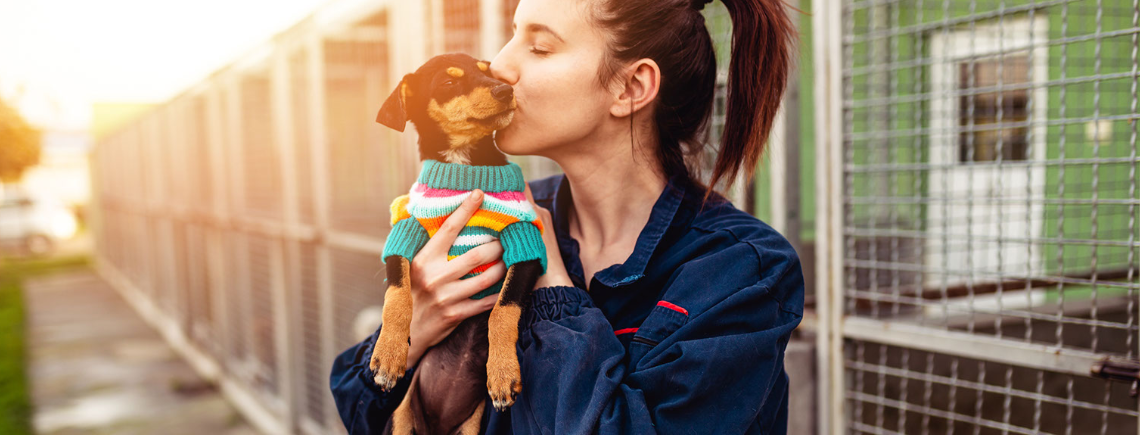7 Things To Consider Before Adopting a Rescue Dog
Adopting a dog from a shelter can be a great and wonderful thing for the whole family, but it comes with a big responsibility. There’s lots to consider before you decide to commit to adopting a dog. Your goal is to provide this dog with a forever home, so it’s essential to know and understand what you are getting into. A dog is a multi-year commitment of care, which involves ensuring their safety, wellbeing, feeding and housing them, and keeping them happy and healthy. Shelter dogs can sometimes present some unique challenges for owners, so we have compiled a list of 7 essential things you need to consider before starting the process of rescuing a dog.
1.Are You Ready?
The most important question you and your family need to ask yourselves before bringing home a new family member; are you ready? It may seem obvious, but adopting a dog is not a decision to be taken lightly. Everyone in your household needs to be on board with the decision to adopt a dog and understand the commitments of time, money, and care that owning a pet involves. Do you live in an apartment, or a house with a big garden? Does your family travel a lot? Who will be there to let your dog out when you’re at work? Do your family members want a new dog as much as you do? These are just some of the questions you need to ask before going to the shelter.
2.What Is The Dog’s Health Status?
So, you’ve decided you are absolutely ready to bring home a rescue dog. Before you do, it’s important to know what level of veterinary care the dog has received from the shelter or rescue. Are the dog’s vaccinations up to date? Has the dog been spayed or neutered? You’ll want to not only know what kind of care you will need to initially provide, but in the long-term too. This could potentially increase the cost of care and may impact the activities the dog can participate in. If you can provide this level of care, that’s great; but if not, it’s best to reconsider. Always ask the shelter for any known health conditions so you can make an informed decision.

3. What Is The Dog’s Personality Like?
Rescue dogs, especially older ones, can often be unpredictable and even if they appear calm and collected, it pays to be safe. Don’t ever leave children alone with the dog, and be sure to take your time getting to know them. Better to err on the side of caution until the dog is comfortable in their new home. Not all dogs at the shelter are abused dogs and not everyone has been mistreated, but its best to be prepared for any unpredictability.
4. Do You Know The Dog’s Breed?
Sometimes it can be easy to tell what breed your rescue is, and other times, it’s near impossible to tell. Knowing the breed can be helpful in knowing what kind of behaviours to expect or how large your tiny pup will grow up to be. Cross-breed may exhibit behaviours of various breeds, but every dog is individually different. It is vital that if you are looking for specific breeds, that you do your research. Some breeds are not appropriate for families with small children, or other dogs. If you have your heart set on a particular breed, try reaching out to a responsible breeder about that specific breed. If you do decide to adopt, always expect the unexpected with mixed breeds, especially with young puppies.
5. Do You Have Other Pets?
When adopting a rescue dog, it’s essential to consider any other animals you have in your home. Does the dog you are hoping to adopt get along with other animals, or are they more of a lone ranger? Are they cautious of other animals? Is your current pet wary of other animals or do they get overly excited? When adopting a new pet into the family it’s important to consider both your new pet and the pets you already have and to make introductions slowly in a neutral environment under strict supervision.
6. What Nearby Services are available?
Make sure you are relatively close or have access to essential services that will benefit your dog. These services include veterinarians, dog groomers, animal behaviourists and classes, dog sitters, dog walkers and of course, pet shops. Is there a nearby park that you can bring your rescue dog to? What about a more quiet area in case your dog gets nervous? It’s important to consider these things before bringing home your dog from the shelter.
7. Is The Dog Trained?
Consistent training is important in establishing new habits and teaching your new dog the boundaries and rules of his new “pack.” Your dog may come already trained in some ways, such as going to the toilet or learning to come back, but if not, you need to be prepared for the time and effort required to teach these skills.
Another important aspect of training is that it must include every human who lives in the house, especially children, who must find a way to communicate with your pets so the pet listens to them as well.

